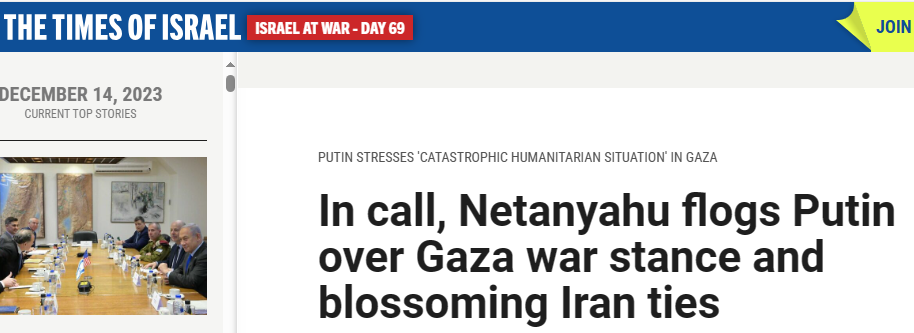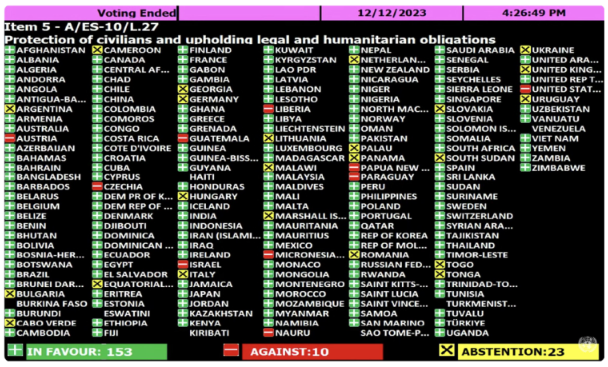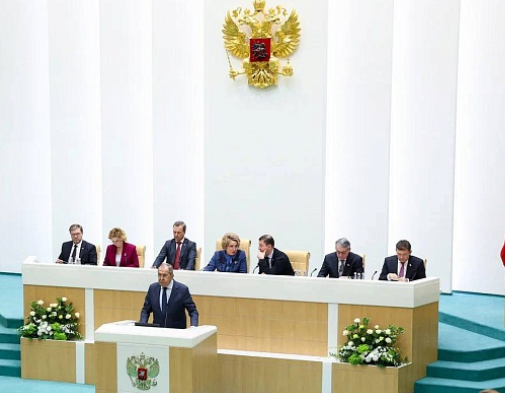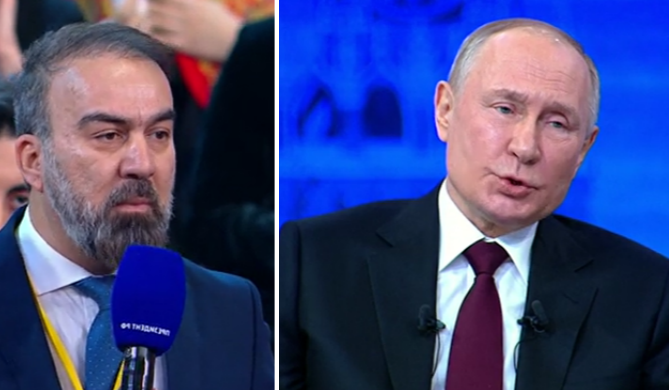

by John Helmer, Moscow
@bears_with
President Vladimir Putin has revealed secret details of the Russian initiative on the Gaza war.
According to the President, Russia has a three-point proposal. “First, it is necessary to keep people in Gaza. Second, it is necessary to bring humanitarian aid on a massive scale to these people.”
Putin’s third proposal is establish a Russian field hospital to treat wounded Palestinians at the Rafah stadium, rebuilt in 2019 after Israel destroyed the original one in 2009. “But for this to happen, we need to have consent from both Egypt and Israel. I talked to the President of Egypt, and he is in favour of this idea. I also talked to Prime Minister Netanyahu, and they consulted various armed agencies. The Israeli side believes that opening a Russian hospital in Gaza is not safe.”
Putin made his disclosures in response to a Turkish reporter’s question about the Gaza war during the Direct Line broadcast on Thursday.
Putin did not mention a ceasefire; he did not criticize Israeli military operations in Gaza except to refer to the deaths of children. “The Secretary-General of the United Nations called today’s Gaza the biggest children’s cemetery in the world. This opinion speaks volumes. It is an objective opinion, what else can I say?”
Putin praised the Turkish President Recep Tayyip Erdogan for “playing a significant leading role in improving the situation in Gaza…He is very active in this matter. And God bless him.”
Putin omitted to mention Iran, ignoring his talks in Moscow a week ago with Iranian President Ebrahim Raisi. Following their five-hour negotiations, Iranian Foreign Minister Hossein Amir Abdollahian announced that “Russia is thinking about an initiative on Gaza.”
A Moscow political analyst commented after viewing Putin’s latest remarks: “Netanyahu refused a Russian field hospital but allows a UAE one? That is telling. This shows that Putin defers to the Israelis on anything related to Gaza. Nothing has changed in his position.”
This is what happened in the Putin-Raisi talks on December 7.
To follow the subsequent telephone calls Putin exchanged with Egyptian President Abdel Fattah el-Sisi and Israel’s Prime Minister Benjamin Netanyahu on December 9, read this.

Source: https://www.timesofisrael.com/
The Kremlin communiqué did not reveal what Netanyahu had told Putin. Subsequently, Netanyahu’s office briefed the Israeli press to report that in the 50-minute conversation, Netanyahu took the offensive, “flogs Putin”, and “expressed his annoyance over anti-Israel stances by Russian representatives at the United Nations and other fora…[and] sharp criticism over the dangerous cooperation between Russia and Iran.”
The lead image shows the official opening of the UAE’s field hospital on December 3; the location is at the Rafah stadium in Gaza. A news report and video tour of the hospital facilities can be followed by clicking on this link.
Putin’s disclosure of his idea of a Russian field hospital at the same location as the UAE hospital appears to clarify the role he has been discussing with the director of the Federal Service of National Guard Troops, Viktor Zolotov. That was first reported here.
During yesterday’s four-hour long session, Putin mentioned his negotiations with Israel, the United Arab Emirates (UAE), Saudi Arabia, Egypt, and Turkey. There is no mention of Iran in the Kremlin transcript of the broadcast. “Not to mention Iran can indicate there are some secret discussions,” a Moscow source says, “although I doubt it. There are secret discussions at the military level and at the foreign ministry level. But not with Putin.”
Putin also stopped short of defending his Foreign Ministry’s attempts over two months and several sessions of the United Nations Security Council (UNSC) to secure international backing for a ceasefire, a stop to Israeli attacks on civilian targets, and humanitarian relief – every one vetoed by the US; read more here.
“As for the UN’s role,” Putin said, “you know, it is nothing out of the ordinary and I have already said that. During the Cold War, there were different forces and different countries that often blocked decisions promoted by other countries. But the United Nations was initially created for the purpose of finding a consensus. Without a consensus, decisions cannot be made. So, nothing out of the ordinary is happening at the UN; it was always like this, especially during the Cold War. There is a reason why Foreign Minister of the USSR Gromyko had the nickname, Mr No, because the Soviet Union very frequently vetoed decisions. It is very significant. When there is a veto, no steps that a country sees as hostile towards itself will be taken. And it is important. It is important to preserve such mechanisms in the UN; otherwise it will simply be reduced to a talking shop as happened during a certain period after World War I.”
Two days before Direct Line, Putin had been briefed by the Foreign Ministry on the success of Russian diplomats at the UN in mobilizing a overwhelming majority of the UN General Assembly (UNGA) member states to vote for an “immediate humanitarian ceasefire”, 153 to 10. The US led the No votes; the UK and Ukraine abstained.

For a country-by-country tally and report of which countries are changing their votes against Israel, click: https://www.aljazeera.com/
The text of the UNGA resolution represents the largest international consensus for the Palestinians against Israel since the Gaza war began; click to read. This consensus continues to grow as voter protests intensify in pro-Israel countries like Australia, Canada, Greece, and Cyprus.
“Nothing out of the ordinary is happening at the UN,” Putin said yesterday, contradicting the Foreign Ministry which had already announced: “in less than 24 hours, the draft resolution prepared by the UAE received the support of the overwhelming majority of UN member states: 102 countries co-sponsored it. On December 8, 13 delegations voted in favour, and the UK abstained. Who brought all this work to naught? The United States again… This is the decision of one country – the United States.”
Putin also refused to endorse Foreign Minister Sergei Lavrov who briefed the Federation Council, the upper house of the Russian parliament, the day before, on December 13. “We are doing all we can,” Lavrov said. “We are resolving the immediate tasks of freeing people who were taken hostage or want to leave Gaza, being Russian citizens. This is our priority today. In parallel, we consider it important to resolve humanitarian problems in a broader, more sustained way. I am referring to the provision of medical and other services, and delivery of humanitarian relief to those who remain in the Gaza Strip and cannot leave it for different reasons. The third goal is a ceasefire. It is required not only for addressing humanitarian issues but on a permanent basis to deal with a problem that still has not been resolved after 75 years – this is the creation of a Palestinian state.”

Lavrov speaking during the Government Hour question-and-answer session at the Federation Council on December 13: https://mid.ru/
Lavrov added a new point to the Russian initiative: “The only way to achieve a fair and permanent solution to this problem is to hold an international conference with the participation of the five permanent members of the UN Security Council, the Arab League, the OIC [Organisation of Islamic Cooperation] and the Gulf Cooperation Council, in view of the fact that Saudi Arabia is the author of the Arab Peace Initiative under which all Arab countries would normalise relations with Israel after a viable, functional Palestinian state was created. No doubt, the UN must play a leading role in convening such an event.”
“It is necessary to create the foundations for an Israeli-Palestinian settlement”, Putin said without mentioning the international conference. Read the full transcript of Putin’s remarks on the Gaza war:

Left, Turkish journalist Ali Jura asking the Gaza war questions; right, President Putin answering him. The Kremlin video record includes for the first time an English voiceover: http://en.kremlin.ru/
The question and answer on Gaza can be followed at Min 42-50.
“Ali Jura: Ali Jura, Anadolu Agency. Mr President, as a result of Israel’s attack on Gaza, a child dies every 6–7 minutes. Eight thousand Palestinian children and more than 6,000 women have already died. Unfortunately, the UN and world major powers are not able to stop these attacks. Do you think the UN has lost its function? Also, with respect to Palestine, are Turkiye and Russia working together to ensure peace in the region? What are Moscow and Ankara’s common plans on international and regional issues? Do you plan to visit Turkiye any time soon? Thank you.
“Vladimir Putin: First of all, of course, I am watching the developments in Gaza. I will tell you what I think. In general, I agree with you, but it should be noted that President of Turkiye Erdogan is playing a significant leading role in improving the situation in Gaza. He is certainly one of the leaders of the international community who is paying attention to this tragedy and doing everything to change the situation for the better, so that conditions are created for a lasting peace. This is obvious. He is very active in this matter. And God bless him. Because what is happening is, of course, a disaster.
We were just talking about the Ukraine crisis – and we will return to it later. You and the audience here, everybody in the world can see (compare the special military operation and Gaza and you will see the difference): nothing of this kind is happening in Ukraine.
You mentioned the deaths of thousands of women and children. The Secretary-General of the United Nations called today’s Gaza the biggest children’s cemetery in the world. This opinion speaks volumes. It is an objective opinion, what else can I say?
As for the UN’s role, you know, it is nothing out of the ordinary and I have already said that. During the Cold War, there were different forces and different countries that often blocked decisions promoted by other countries. But the United Nations was initially created for the purpose of finding a consensus. Without a consensus, decisions cannot be made. So, nothing out of the ordinary is happening at the UN; it was always like this, especially during the Cold War. There is a reason why Foreign Minister of the USSR Gromyko had the nickname, Mr No, because the Soviet Union very frequently vetoed decisions. It is very significant. When there is a veto, no steps that a country sees as hostile towards itself will be taken. And it is important. It is important to preserve such mechanisms in the UN; otherwise it will simply be reduced to a talking shop as happened during a certain period after World War I.
But it does not mean that we cannot and should not seek these consensuses. We should. We, like Turkiye, proceed from the premise that the UN decisions to create a Palestinian state with its capital in East Jerusalem should, after all, be implemented, and this is extremely important. It is necessary to create the foundations for an Israeli-Palestinian settlement.
Now let us talk about plans. President Erdogan and I are in constant contact on these issues, and our positions are very similar. I think that we will manage to meet; in fact, I am planning to do just that. I also planned this quite recently, but I can say – there are no secrets in this regard – that it did not work out on account of President Erdogan’s busy schedule. I was prepared to take a flight to Turkiye, and I told him so, but it failed to transpire because of his busy schedule. He was unable to meet, not me. This happens sometimes. But we continue to have talks and perhaps we will arrange this visit early next year.
And now let us look at our efforts. As you may know, I visited two Arab countries not so long ago and had consultations with our friends in Saudi Arabia and the United Arab Emirates. We are also in contact with Egypt.
First, it is necessary to keep people in Gaza.
Second, it is necessary to bring humanitarian aid on a massive scale to these people.
When I was on my visit to the Emirates, it transpired that the UAE had opened a field hospital in Gaza, not far from the Rafah border crossing and the Egyptian border. We discussed whether it was possible for Russia to open a hospital of its own at a stadium in the same area. But for this to happen, we need to have consent from both Egypt and Israel. I talked to the President of Egypt, and he is in favour of this idea. I also talked to Prime Minister Netanyahu, and they consulted various armed agencies. The Israeli side believes that opening a Russian hospital in Gaza is not safe.
But this does not mean that we will discontinue our efforts. If today this is not safe and the Israeli side does not support the idea, we nevertheless have agreements with the Israelis, and they asked us to step up our deliveries of medical equipment and medicines, and we will certainly do that. So, we are in contact with all parties involved under the current developments and will work actively on this.”











Leave a Reply